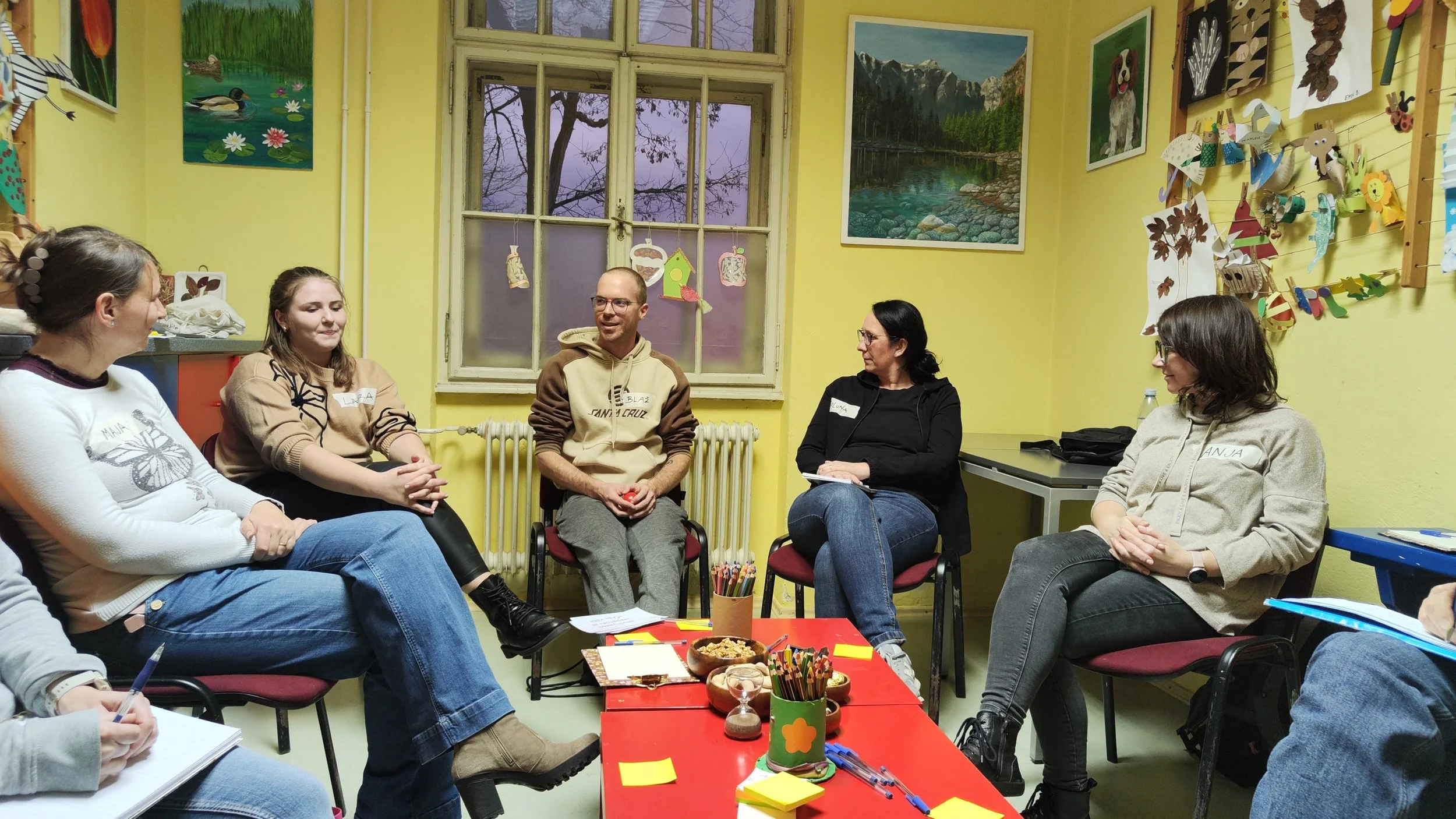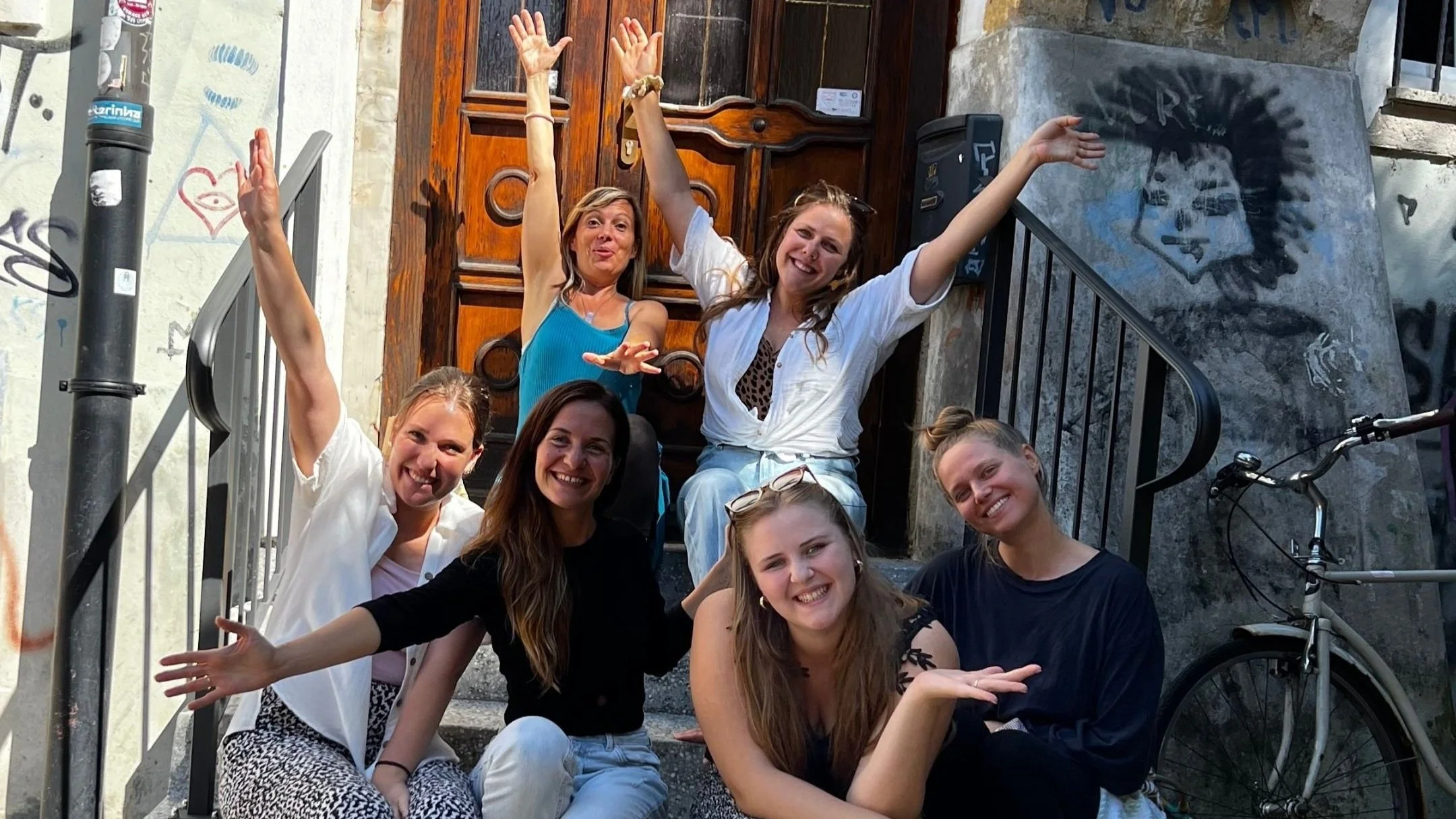Textherapy: Creative Writing for Mental Health
Creative writing as a pathway to self-awareness, emotional well-being, and personal growth. We guide participants through a mindful process of reflection, expression, and sharing — turning words into tools for clarity, connection, and change.
Project Pillar: Well-being
Status: Finished (from August 2024 to June 2025)
Co-Funded by EU
About the project
-
To preserve and strengthen mental health in local communities - especially in underserved and rural areas - through creative writing methods that promote self-expression, empathy, functional literacy, and intergenerational connection.
-
We combined facilitator training, community-based workshops, and public sharing. The approach was grounded in the Creative Cycle – Plant • Grow • Harvest:
Plant: Internal training for volunteers with an instructor to develop facilitation skills and confidence.
Grow: Implementation of workshops using tested creative writing methods, adapted for different audiences.
Harvest: Public sharing of outcomes through local and national media, a dedicated Instagram channel, and a facilitator’s handbook.
-
Target group:
Age range: 22–91 years.
Occupations and backgrounds: Seniors living in retirement homes; unemployed individuals; employed adults in sectors such as education, health, and administration; young people in tertiary education.
Geographic reach: Participants came from rural and small-town Slovenia, including areas with limited access to cultural and mental-health-supportive programs.
Core team: Five trained female volunteers aged 18–30, with backgrounds in social pedagogy, preschool education, youth work, and community development.
Instructor: Dr. Alja Adam — poet, lecturer, Gestalt psychotherapy trainee, and experienced facilitator in creative processes and arts-based counselling.
-
Seed – Prepare with Intention
Internal training for five young volunteers on creative facilitation, working with vulnerable groups, and adapting methods to different age groups.
Development of the Textherapy workshop format, including vocabulary-building exercises, creative prompts, and safe-space guidelines.
Community outreach and partnership building with retirement homes, libraries, and local cultural centers.
Grow – Create Within Frameworks
Seven Textherapy workshops in Notranje Gorice, Vrhnika, Zagorje ob Savi, Logatec, Idrija, Črni Vrh, and online.
Guided writing sessions using thematic prompts to encourage self-reflection, emotional expression, and creative thinking.
Adaptation of content to suit each target group’s needs (e.g., handwriting focus for seniors, resilience-building for youth).
Harvest – Share, Reflect, Inspire
Group sharing circles in each workshop, encouraging participants to present their work and exchange feedback.
Creation and publication of the Textherapy Handbook for facilitators, capturing practical tips and exercises.
Public presentations, including a live appearance on Jutro na Planetu.
Instagram storytelling campaign (@tekstoterapija) with 56 posts and over 160 followers.
-
Funding from the European Solidarity Corps (Co-Funded by EU).
Local partners: retirement homes, libraries, and municipal cultural centers.
Digital tools for coordination and promotion (Google Workspace, Canva, Meta Business Suite).
Expertise from Dr. Alja Adam and the multidisciplinary volunteer team.
-
Capacity building: Trained five new facilitators in creative-counselling methods, equipping them to run similar workshops in the future.
Community reach: Delivered workshops to 47 individuals from geographically remote and underserved Slovenian communities.
Personal outcomes: Participants reported measurable improvements in self-expression confidence, emotional well-being, and functional literacy, along with a renewed appreciation for handwriting and slow, focused work.
Social outcomes: Strengthened intergenerational connections and fostered empathy within participating towns.
Public awareness: Increased recognition of creative writing as a mental health support tool through local media coverage, national television (Jutro na Planetu), and ongoing social media storytelling.
Knowledge sharing: Developed a Textherapy Handbook containing 10 concrete guidelines for facilitators, based on direct practical experience.
-
The Plant phase proved crucial in building confidence and unlocking creativity. Based on feedback, future steps include:
Developing an online training for new Textherapy facilitators.
Establishing a national facilitator network.
Expanding the program to more rural and underserved areas.
We created a short guidebook that gathers the key insights from our work with local communities.
We share it with the hope that it will spark ideas for developing similar creative workshops for personal growth or support you in your work in other ways. Before diving into the insights, you’ll find step-by-step instructions for conducting the workshop. We warmly invite you to see them as an invitation and to explore the secret power of Textherapy yourself.
Follow our journey.
Funded by the European Union. Views and opinions expressed are however, those of the author(s) only and do not necessarily reflect those of the European Union or national agency. Neither the European Union nor the granting authority can be held responsible for them.



















